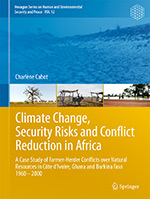|
|
| |
|
| |

Hexagon
Series on
Human, Environmental Security and Peace (HESP)
Edited by
Hans Günter Brauch,
AFES-PRESS, chairman
Free University of Berlin (Ret.)
 |
HEXA-
GON
Series
Vol 12 |
Charlène Cabot: Climate Change, Security Risks, and Conflict Reduction in Africa: A Case Study of Farmer-Herder Conflicts over Natural Resources in Côte d’Ivoire, Ghana, and Burkina Faso. Hexagon Series on Human and Environmental Security and Peace, vol. 12 (Berlin – Heidelberg – New York: Springer, 2016).
ISBN: 978-3-642-29236-1 (Print)
ISBN: 978-3-642-29237-8 (Online)
DOI 10.1007/978-3-642-29237-8
Order this book on Springer Website
Electronic Version of book and individual chapters
Product Flyer |
Contents
Author
Publisher
|
On this Book
Millions of people are already affected by weather-related shocks every year in West Africa and climate change is highly likely to increase these threats. In the wake of climate change, rising temperatures, increasingly irregular rainfall and more frequent natural hazards will endanger the ways of life of vulnerable population groups in this region and destabilize their human security. A surge in violence and conflicts could take place. One of the conflict constellations could be between farmers and herders. These groups are highly vulnerable to climate change due to their dependence on natural resources for their subsistence. Furthermore, they are historically prone to enter into conflict over issues of access to natural resources. However, social, economic and political circumstances fundamentally influence environmental conflicts. There might thus be opportunities to face the societal challenges of climate change in a peaceful way and the political and institutional framework could play an important role in reducing conflict and violence. In order to explore such a path, this study analyses the potential of political factors (policies and institutions) for the reduction of climate-change-induced or aggravated conflicts between farmers and herders. After a theoretical demonstration, a case study of agro-pastoral conflicts in Burkina Faso, Côte d’Ivoire, and Ghana is conducted. |
| |
|
|
|
 |
Charlène Cabot (born 1988 in France) completed her undergraduate studies in Political and Social Sciences at Sciences Po Paris and at the University of Sydney. Ms Cabot subsequently obtained a double Master’s degree in International Relations from Sciences Po Paris and the Free University of Berlin with a major in Sustainable Development and Environmental Politics (2011). Ms Cabot joined the United Nations World Food Programme (WFP) in December 2011. After working in Germany, Senegal, the Central African Republic Cameroon, and and in the Policy and Programme Division at WFP headquarters, she is currently based in N’Djamena (Chad).
|
| |
|
|
Foreword |
The international community is facing new and unprecedented security challenges. Each new decade of this millennium has come with its own challenges; from the droughts that led to the food riots of 2008, to the ‘Arab Spring’ that began in 2010, to the new forms of terrorism and migration flows that are emerging. These challenges are growing from one year to the next.
More than 219,000 people arrived in Europe in 2014, for example. In the first four months of 2015, another 36,000 landed on the shores of Greece, Italy and Malta. A majority of the arrivals are from Eritrea, Somalia and Syria. Many others come from Afghanistan, Gambia, Nigeria, Mali and Sudan. They are fleeing from conflict or the threat of conflict.
By 2020, some 60 million people are expected to move from ‘desertified’ areas to northern Africa and Europe, and this figure is highly likely to grow by 2045, according to the 2014 United Kingdom Ministry of Defence publication, Global Strategic Trends—Out to 2045 (London: UK MoD, 2014).
But migration is not a challenge for Europe and Africa alone. Every year between 600,000 and 700,000 people migrate from the dryland areas of Mexico, for instance.
Ordinary people and governments everywhere are overwhelmed by these developments—and for good reason. The future is expected to get worse due to climate change. And pressure is growing to address real—and imagined—public fears that are anticipated from climate change threats.
The 2009 G-8 Summit, in its L’Aquila Declaration, stated that there is a reciprocal relationship between land degradation and climate change and stressed the need for action on both issues. And although we know a lot about climate change and about land degradation, the science of how these two phenomena interact and shape human action is still developing.
Thus, we know that the impacts of climate change will be different across geographical regions, but not how specifically. It means we cannot forecast how the poor urban or the rural populations in the Sahel will respond to the combined effects of climate change and desertification.
Rigorous scholarly work that can tease out the causes and effects of these phenomena is vital for the design of effective policy and in order to allay unfounded public fears. Policymakers are demanding robust knowledge about the relationships migration and conflict have with climate change and land degradation or desertification (as it is known when it occurs in arid and semi-arid areas). This publication moves us in that direction.
It is provocative, and although it builds on premises that are still contested, scientists, policymakers and the public will find its conclusions interesting. The author picks a piece of this complex issue and explains the situation of farmers and pastoral communities in the Sahel in simple and accessible language. If you want to understand or are dealing with conflicts among farming and pastoral communities in the Sahel or in other parts of the world, this book is an essential read.
Bonn, in June 2015
Monique Barbut, Executive Secretary
United Nations Convention to Combat Desertification (UNCCD) |
 |
| |
|
Prefaces |
The book contains two prefaces by
|
 |
PD Dr. Hans Günter Brauch, Chairman, Peace Research and European Security Studies (AFES-PRESS)
Editor, of five scientific and English language book series
published by Springer International Publishing |
 |
Ibrahim Seaga Shaw, PhD Senior Lecturer in Media and Politics,
Northumbria University, Newcastle upon Tyne
UK Secretary General, International Peace Research Association |
| |
|
|
| Both prefaces may be read here after publication. |
|
| |
|
|
More on this book
|
Publisher's Corner
|
|
|
|